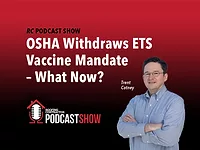What Roofing Companies Need to Know About OSHA's Vaccine Mandate ETS
Businesses with 100 or More Employees Must Follow New ETS

The Occupational Safety and Health Administration (OSHA) announced the details of its new COVID-19 vaccine requirement that large roofing companies and businesses must follow.
Under this new emergency temporary standard (ETS), all employers with 100 or more employees must develop, implement and enforce a policy that requires all employees to either be vaccinated or undergo regular COVID-19 testing. The ETS also requires employers to provide paid time off to workers to get vaccinated as well as to recover from any side effects.
The ETS is effective Nov. 5. Employers have 30 days to comply with most requirements and 60 days (until Jan. 4, 2022) to comply with testing requirements. OSHA anticipates the ETS will be in effect for six months.
Since 2020, the coronavirus has led to the deaths of 750,000 people in the U.S., and the infection of millions more, making it the deadliest pandemic in the nation's history.
“COVID-19 has had a devastating impact on workers, and we continue to see dangerous levels of cases,” said U.S. Labor Secretary Marty Walsh. “We must take action to implement this emergency temporary standard to contain the virus and protect people in the workplace against the grave danger of COVID-19.”
Here’s a breakdown of what roofing contractors need to know.
Who Counts?
An FAQ on the ETS addresses employers like roofing contractors who perform work at offsite locations such as customer homes, stating all employees are counted regarding the 100 threshold.
“If an employer has 150 employees, and 100 of them perform maintenance work in customers’ homes, primarily working from their company vehicles (i.e., mobile workplaces), and rarely or never report to the main office, that employer would fall within the scope of the standard,” the FAQ states.
The count should be done at the employer level, not the individual location level, so businesses with multiple offices need to count all employees for the total. However, in a franchisor/franchisee setting, if individual franchisees have fewer than 100 employees, the individual franchises would not be covered.
Part-time employees are included in the total, but independent contractors are not counted. Temporary/seasonal workers employed directly by the employer are counted.
Outdoor Workers
While roofing mainly takes place outdoors, roofing contractor employees may still need to comply with the ETS. Employees who work exclusively outdoors are counted in the total employees, but exclusively outdoor workers do not need to follow the standard’s protections.
OSHA defines outdoor workers as such:
- Employees who work outdoors on all days. An employee who works indoors on some days and outdoors on other days would not be exempt.
- The employee must not routinely occupy vehicles with other employees as part of work duties (i.e., do not drive to worksites together in a company vehicle).
- The employee works outdoors for the duration of every workday except for de minimis use of indoor spaces where other individuals may be present – such as a multi-stall bathroom or an administrative office – as long as the time spent indoors is brief, or occurs exclusively in the employee’s home.
Employers Must Determine, Track Vaccination Status
The ETS requires employers to determine the vaccination status of each employee through acceptable proof of their status and maintain records of employee vaccination statuses. Vaccination records are acceptable methods of proof. In certain circumstances, signed and dated statements from the employee are acceptable.
These records are considered medical records and should be treated as such.
Work-related COVID-19 fatalities must be reported to OSHA within eight hours of learning about them, and COVID-19 in-patient hospitalizations within 24 hours.
Testing for Employees Not Fully Vaccinated
Employers will need to ensure each worker who isn’t fully vaccinated is tested for COVID-19 at least weekly or within seven days before returning to work if they’re away from work for at least a week. This includes employees who are entitled to a reasonable accommodation due to a disability or sincerely held religious beliefs.
Employees need to provide prompt notice if they test positive for COVID-19, and employers must remove the employee from the workplace regardless of vaccination status. The employee can only return if they receive a negative test, meets CDC criteria for isolation guidance or a licensed healthcare provider clears them to return.
In most circumstances, employers need to ensure workers not fully vaccinated are wearing a face covering indoors or when in a work vehicle with other people for work purposes.
Employers are not required to pay for testing under the ETS, nor are they required to pay for face coverings. Employers might be required to pay for testing under other laws, regulations or collective bargaining agreements.
Employees who previously had COVID are not classified as being fully vaccinated, and must either get vaccinated or undergo regular testing.
Disciplining Non-Vaccinated Employees
The OSH Act provides that employers may not discharge or retaliate against an employee because they exercised a right under the OSH Act. However, the OSH Act doesn’t stop employers from taking disciplinary action against employees engaging in activities not protected under the OSH Act. This can include an employee’s refusal to comply with an employer’s vaccination policy.
Time Off for Employees
Employers must provide a maximum of four hours of paid time off for each primary vaccination dose. This cannot be offset by any other leave the employee has accrued, like sick or vacation leave.
If an employee has accrued paid sick leave, an employer can require them to use that paid sick leave when recovering from side effects. Employers can put a cap on the time they must provide to employees to recover from side effects.
Penalties
OSHA may issue a penalty for violating or failing to follow the ETS. The penalty for noncompliance is up to $13,653 per violation, while the penalty for repeated violations may be up to $13,653 per day. For willful or repeated violations, the penalty could be as high as $136,532 per violation.
ETS Overrides State, Local Policy
The ETS preempts and invalidates any state or local requirements that ban or limit an employer’s authority to require vaccinations, face coverings and COVID-19 testing. In other words, it supersedes efforts made by states like Texas to ban vaccine mandates.
“State and local requirements that prohibit employers from implementing employee vaccination mandates, or from requiring face coverings in workplaces, serve as a barrier to OSHA’s implementation of this ETS, and to the protection of America’s workforce from COVID-19,” OSHA’s FAQ states.
ETS Doesn’t Apply to Federal Contractors
Federal contractors must adhere to the Safer Federal Workforce Task Force COVID-19 Workplace Safety Guidance. Details about this guidance were released Nov. 1.
What Should Roofing Companies Do Now?
Here are some basic steps roofing companies should follow to comply with the ETS:
- Determine if your company is subject to the ETS based on employee count
- Review and amend any current policies to comply with the ETS. Template policies are available from OSHA
- See if any local or state laws determine whether employers must cover testing costs
- Create a process for collecting and maintaining vaccination and testing records
Looking for a reprint of this article?
From high-res PDFs to custom plaques, order your copy today!







